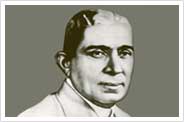
 Shri Nanjibhai Kalidas Mehta, the founder of the Mehta Group, was endowed with exceptional entrepreneurial abilities. He was a true humanist who loved people; and philanthropic generosity was second nature to him. He was an ardent nationalist and a contemporary of the Father of the Nation who practiced the doctrines of the Mahatma.
Shri Nanjibhai Kalidas Mehta, the founder of the Mehta Group, was endowed with exceptional entrepreneurial abilities. He was a true humanist who loved people; and philanthropic generosity was second nature to him. He was an ardent nationalist and a contemporary of the Father of the Nation who practiced the doctrines of the Mahatma.
Early days
He was born at Gorana village, near Porbandar in the State of Gujarat in India, on 17th November, 1887. Driven by a spirit of adventure, he set sail to the shores of Africa at age 13, in the year 1900. The measure of his adventurous, enterprising and persevering spirit can be gauged from his 46 trips between India and Africa at a time when sea voyages were fraught with uncertainty and danger.
From his small trading outpost, it did not take long for his entrepreneurial ability to realise the vast potential of the land and start with vegetable growing. He also introduced varieties of cotton through seeds imported from India, and soon had 29 ginneries.
The sweet Taste of Success
The real reward came when he successfully grew sugarcane in the ubiquitous swamps of Africa and thereafter ventured into the manufacture of sugar. Thereafter he turned his attention to tea and coffee plantations.
An Industrial Empire on the Foundation of Humanity
What endeared him to the people of Africa was his affection for all people – especially the oppressed and downtrodden. Today, the various industries and business houses of the Mehta Group in Uganda and Kenya bear testimony to his contribution to the economic well-being of the people.
Having created employment opportunities for more than 10,000 Africans through his various activities and after firmly establishing his business empire in Africa, he turned his attention to India. The first unit he established in India was a textile unit at Porbandar. This was followed by oil mills, ginneries and a cement plant.
Inspiring Structures
Set amidst sprawling 90 acre sylvan surroundings, the Arya Kanya Gurukul complex at Porbandar, Gujarat, established by the founder, is dedicated to female education in modern India. The education system at Gurukul is a blend of rich ancient Vedic heritage and modern educational systems with an orientation towards science and technology.
Nanjibhai always kept pace with technological developments and established the Jawaharlal Nehru Planetarium - the first of its kind in Western India.
Besides the Gurukul complex he erected the Kirti Mandir, a monument in memory of Gandhiji in his birth place, Porbandar. Similarly, keeping alive the memory of Swami Dayanand Saraswati, he built the Maharshi Dayanand Science College and donated it to the Education Society of Porbandar. It was characteristic of Nanjibhai that having erected the monument, he donated it to the Nation.
Nanjibhai imbibed Gandhiji's doctrine of trusteeship and for a number of years set aside ten percent of his vast earnings for the betterment of society. Even in Africa, Arya Girls School at Nairobi, Kampala and Mombasa; Town Hall, Mehta Library and Jubilee Park at Kampala, Arya Samaj Mandir at Dar-es-Salaam, Women's Association Hall etc,. bear testimony to his contribution.
Glittering Honours
Nanjibhai was honoured during his lifetime by the British Government with the title of M.B.E. for his work in Uganda. His Highness Maharana Shri Natvarsinghji of Porbandar conferred on him the title of Raj Ratna. On the cultural front, the late Kaka Kalelkar honoured him with a Dharma Ratna.
The End of Legend
On 25th August, 1969 Shri Nanjibhai Kalidas Mehta expired. With his passing away, the Mehta Group of Industries lost a mentor, Gurukul a Kulpita and India an entrepreneur of exceptional ability and a humanist of unparalleled generosity.
On the same day Uganda also mourned his death. His Excellency, A. Milton Obote, the President of Uganda at that time said: "In the passing away of Mr. Nanjibhai Mehta, Uganda has lost a true friend and a man who made tremendous contributions in laying the foundations of our economy. It is sad to see the passing of a man of Mr. Mehta's stature, but he will, I am sure, be long remembered for his charitable acts, not only in Uganda and East Africa but also in India."




